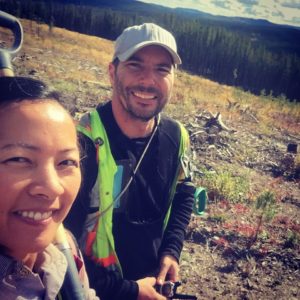Balancing Personal Relationships and Work While in the Field

By: Brooke Gerard
It is no secret that archaeological consulting work has its obvious challenges. After reading that, I know you’re instantly thinking of the long hikes, the physical labour of digging and navigating the challenging weather, and you’d be right! Those things make the work hard, but I want to talk about something different. If you read the title of this blog, then you probably have a pretty good idea of what I’m getting at here. Currently, we are right smack dab in the middle of the infield season, which means we are at the peak of busyness. We are spending a huge amount of time away from home and, as a result, away from our loved ones. Bringing us to the biggest challenge of all, shift work away from home, putting a lot of strain on relationships. This is often very shocking for our new hires and is an ever-present challenge for our veteran employees, yet somehow our industry hardly talks about it! 
Year after year, many employees have come to me (and some have even left as a result of this) to talk about balancing relationships (romantic and friendly) with the time demands of this type of work. At Circle, there are lots of us who are in long-term romantic relationships (including yours truly), so we are always ready and willing to share how we’ve made it work. Check out the tips our resident couples have shared through their personal experiences below.

Communicate – I know, I know. This seems like a no-brainer, right? But seriously, being a clear, consistent, and good communicator is hard even outside our industry. When you only see your partner or close friends/family members for a few days at most out of a month, communication becomes the single most important thing. Before starting fieldwork for the first time, it’s a great idea to talk with your loved ones about how to fill each other’s love bucket. For my partner, he would be okay with a once-a-week catch-up, but I need a little more. This isn’t about combating feelings of loneliness since you usually end up having some great happy and fun moments with your team in the field, but it’s always nice to share stories of the day with your partner who isn’t there. To find out more about how you and your partner show up for each other, I suggest taking The Love Language quiz. This free online test will help you discover your primary love language, what it means, and how you can use it to better connect with your loved ones.
 Prioritize – It’s so easy to get caught up in getting caught up on your down days. BUT it’s super important(at least for most people) to set aside dedicated quality time. Because our window of time to reinforce the bonds with our loved ones is so narrow, it needs to be a priority. Setting aside that time doesn’t have to include a grand event. For myself, quality time with my partner looks like a movie on the couch. Honestly, it’s just taking that little extra time to show someone they matter, especially during our field season.
Prioritize – It’s so easy to get caught up in getting caught up on your down days. BUT it’s super important(at least for most people) to set aside dedicated quality time. Because our window of time to reinforce the bonds with our loved ones is so narrow, it needs to be a priority. Setting aside that time doesn’t have to include a grand event. For myself, quality time with my partner looks like a movie on the couch. Honestly, it’s just taking that little extra time to show someone they matter, especially during our field season.
 Set Boundaries – Wait, what? That’s right; Brookie is throwing in a curveball. I know I just finished stating that it’s crucial to make space and time for our loved ones whenever possible? AND while that’s still true, there is also a flip side. We can only be our best for our loved ones when we are prioritizing ourselves too. I know from personal experience our loved ones don’t always “understand” (even when they try to). As such, it’s so easy to allow our partners to cram as many activities into four days as humanly possible. I think that can lead to compounding fatigue (for me, this looks like social fatigue. I know, surprisingly, I’m a secret introvert!). This kind of overpromising and commitment to plans can result in unnecessary stress on relationships and your mental health. It’s okay to say, “Hey, my shift was pretty tough, and I can’t do all these things you have planned.” Allowing ourselves to recharge helps us to show up as better partners in the long run.
Set Boundaries – Wait, what? That’s right; Brookie is throwing in a curveball. I know I just finished stating that it’s crucial to make space and time for our loved ones whenever possible? AND while that’s still true, there is also a flip side. We can only be our best for our loved ones when we are prioritizing ourselves too. I know from personal experience our loved ones don’t always “understand” (even when they try to). As such, it’s so easy to allow our partners to cram as many activities into four days as humanly possible. I think that can lead to compounding fatigue (for me, this looks like social fatigue. I know, surprisingly, I’m a secret introvert!). This kind of overpromising and commitment to plans can result in unnecessary stress on relationships and your mental health. It’s okay to say, “Hey, my shift was pretty tough, and I can’t do all these things you have planned.” Allowing ourselves to recharge helps us to show up as better partners in the long run.

Honestly, the most important thing to remember, especially for those just starting in their careers, is that our work puts some pressure on relationships, and there isn’t a one-size-fits-all solution to that. In this line of work, you have to learn to be strong and independent apart from your partner. While it’s okay to miss having them around, you’ll find that it’s not too hard to fill those gaps with other things (aka stay tuned for an upcoming blog post on hobbies in the field!) To keep a healthy work/relationship balance, don’t be hesitant to evaluate and reevaluate what is and isn’t working. Never feel bad for advocating for what you want in your relationship. Remember that field season does have an end, so if it helps, you can think of your relationship as long-distance (for only a couple of months, thankfully).


